Book
ISBN: 0745605117 0745602401 9780745605111 9780745602400 Year: 1987 Publisher: Cambridge Polity press
Abstract | Keywords | Export | Availability | Bookmark
 Loading...
Loading...Choose an application
- Reference Manager
- EndNote
- RefWorks (Direct export to RefWorks)
Hermeneutics --- History --- Gadamer, Hans-Georg, --- -Interpretation, Methodology of --- Criticism --- -Gadamer, Hans Georg --- -History --- Gadamer, Hans-Georg --- Metaphysics --- Theory of knowledge --- Hermeneutics - History - 20th century --- Gadamer, Hans-Georg, - 1900-2002
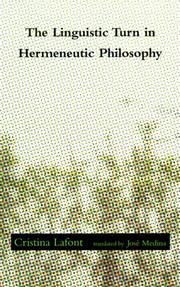
ISBN: 0262122170 026262169X 0262277867 0585190097 9780585190099 9780262277860 9780262122177 9780262621694 Year: 1999 Volume: *17 Publisher: Cambridge (Mass.) MIT press
Abstract | Keywords | Export | Availability | Bookmark
 Loading...
Loading...Choose an application
- Reference Manager
- EndNote
- RefWorks (Direct export to RefWorks)
Annotation The linguistic turn in German philosophy was initiated in the eighteenth century in the work of Johann Georg Hamann, Johann Gottfried von Herder, and Wilhelm von Humboldt. It was further developed in this century by Martin Heidegger, and Hans-Georg Gadamer extended its influence to contemporary philosophers such as Karl-Otto Apel and J?Habermas. This tradition focuses on the world-disclosing dimension of language, emphasizing its communicative over its cognitive function. Although this study is concerned primarily with the German tradition of linguistic philosophy, it is very much informed by the parallel linguistic turn in Anglo-American philosophy, especially the development of theories of direct reference. Cristina Lafont draws upon Hilary Putnam's work in particular to criticize the linguistic idealism and relativism of the German tradition, which she traces back to the assumption that meaning determines reference. Part I is a reconstruction of the linguistic turn in German philosophy from Hamann to Gadamer. Part II offers the deepest account to date of Habermas's approach to language. Part III shows how the shortcomings of German linguistic philosophy can be avoided by developing a consistent and more defensible version of Habermas' theory of communicative rationality.
Philosophy of language --- Theory of knowledge --- anno 1800-1999 --- Germany --- Language and languages --- Hermeneutics --- Philosophy, German --- Philosophy --- History --- -Hermeneutics --- -Language and languages --- -Philosophy, German --- -Foreign languages --- Languages --- Anthropology --- Communication --- Ethnology --- Information theory --- Meaning (Psychology) --- Philology --- Linguistics --- German philosophy --- Interpretation, Methodology of --- Criticism --- -History --- -Philosophy --- -Philosophy of language --- Foreign languages --- 19th century --- Philosophy [German ] --- 20th century --- SOCIAL SCIENCES/Political Science/Political & Social Theory --- PHILOSOPHY/General --- Language and languages - Philosophy - History - 19th century --- Hermeneutics - History - 19th century --- Philosophy, German - 19th century --- Language and languages - Philosophy - History - 20th century --- Hermeneutics - History - 20th century --- Philosophy, German - 20th century
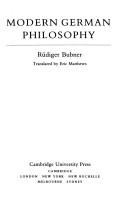
ISBN: 0521297117 0521229081 9780521229081 Year: 1981 Publisher: Cambridge Cambridge University press
Abstract | Keywords | Export | Availability | Bookmark
 Loading...
Loading...Choose an application
- Reference Manager
- EndNote
- RefWorks (Direct export to RefWorks)
History of philosophy --- anno 1900-1999 --- Germany --- Language and languages --- Philosophy, German --- Hermeneutics --- Phenomenology --- Philosophy --- History --- -Language and languages --- -Phenomenology --- -Philosophy, German --- -German philosophy --- Philosophy, Modern --- Foreign languages --- Languages --- Anthropology --- Communication --- Ethnology --- Information theory --- Meaning (Psychology) --- Philology --- Linguistics --- Interpretation, Methodology of --- Criticism --- -History --- Language and languages - Philosophy --- Philosophy, German - 20th century --- Hermeneutics - History --- Phenomenology - History
Book
ISBN: 0838750419 9780838750414 Year: 1983 Publisher: Lewisburg, Pa
Abstract | Keywords | Export | Availability | Bookmark
 Loading...
Loading...Choose an application
- Reference Manager
- EndNote
- RefWorks (Direct export to RefWorks)
Theory of knowledge --- Ricoeur, Paul --- Hermeneutics --- History --- Ricœur, Paul --- -Interpretation, Methodology of --- Criticism --- -Ricoeur, Paul --- Lü-ko-erh --- Ricœur, P. --- Li-kʻo, Pao-lo --- ريكور، بول --- ريكور، پول --- Рикёр, Поль --- Rikër, Polʹ --- -Ricœur, Paul. --- Ricœur, Jean Paul Gustave --- -History --- Ricœur, Paul, --- Ricœur, Paul. --- Hermeneutics - History - 20th century --- Ricœur, Paul, - 1913-2005
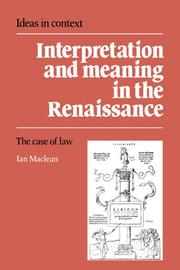
ISBN: 0521415462 Year: 1992 Volume: 21 Publisher: Cambridge Cambridge University Press
Abstract | Keywords | Export | Availability | Bookmark
 Loading...
Loading...Choose an application
- Reference Manager
- EndNote
- RefWorks (Direct export to RefWorks)
History of civilization --- Sociology of law --- anno 1600-1699 --- anno 1500-1599 --- Renaissance --- Hermeneutics --- -Law --- -Renaissance --- Revival of letters --- Civilization --- History, Modern --- Civilization, Medieval --- Civilization, Modern --- Humanism --- Middle Ages --- Acts, Legislative --- Enactments, Legislative --- Laws (Statutes) --- Legislative acts --- Legislative enactments --- Jurisprudence --- Legislation --- Interpretation, Methodology of --- Criticism --- History --- Interpretation and construction --- -History --- Law --- Law - Interpretation and construction - History. --- Hermeneutics - History. --- Renaissance. --- Interpretation and construction&delete&
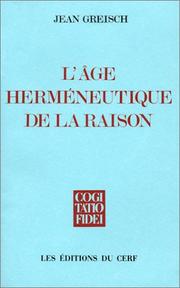
ISSN: 05876036 ISBN: 2204023574 9782204023573 Year: 1985 Volume: 133 Publisher: Paris Cerf
Abstract | Keywords | Export | Availability | Bookmark
 Loading...
Loading...Choose an application
- Reference Manager
- EndNote
- RefWorks (Direct export to RefWorks)
Hermeneutics --- Theology --- History --- 101.8 --- -Theology --- -#gsdb3 --- #GGSB: Dogmatiek --- #GGSB: Hermeneutiek (dogmatiek) --- Christian theology --- Theology, Christian --- Christianity --- Religion --- Interpretation, Methodology of --- Criticism --- Filosofie: methode; taalgebruik; filosofische taal --- -Hermeneutics --- History. --- 101.8 Filosofie: methode; taalgebruik; filosofische taal --- -101.8 --- #gsdb3 --- Herméneutique / en théologie. --- Hermeneutiek / in de godgeleerdheid. --- Dogmatiek --- Hermeneutiek (dogmatiek) --- Hermeneutics - History --- Theology - History - 20th century
Book
ISBN: 2841741478 9782841741472 Year: 1999 Volume: *20 Publisher: Paris Kimé
Abstract | Keywords | Export | Availability | Bookmark
 Loading...
Loading...Choose an application
- Reference Manager
- EndNote
- RefWorks (Direct export to RefWorks)
Hermeneutics --- Herméneutique --- History --- Histoire --- Heidegger, Martin, --- Contributions in hermeneutics. --- Contributions in hermeneutics --- -Interpretation, Methodology of --- Criticism --- -Heidegger, Martin --- -Contributions in hermeneutics --- -History --- Herméneutique --- Heidegger, Martin --- 20th century --- Hermeneutics - History - 20th century --- Heidegger, Martin, - 1889-1976 - Contributions in hermeneutics --- Heidegger, Martin, - 1889-1976
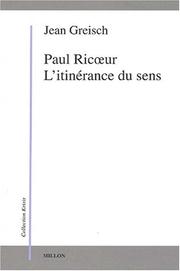
ISSN: 09856684 ISBN: 2841371182 9782841371181 Year: 2001 Publisher: Grenoble Millon
Abstract | Keywords | Export | Availability | Bookmark
 Loading...
Loading...Choose an application
- Reference Manager
- EndNote
- RefWorks (Direct export to RefWorks)
Cet ouvrage, forme le troisième volet d’un triptyque dédié aux différentes expressions que l’idée de phénoménologie herméneutique a reçues dans la philosophie du xxe siècle, se donne pour tâche d’analyser et d’évaluer la contribution de Ricœur à ce courant. Il se focalise d’abord sur la percée herméneutique de 1960, qui a pour arrière-plan une phénoménologie du volontaire et de l’involontaire et une anthropologie de la faillibilité. La seconde partie, placée sous l’égide du « Cogito narratif », retrace la genèse d’une herméneutique de la conscience historique sous le fil conducteur d’une analyse des opérations de mise en intrigue narrative dans le récit de fiction et le récit historique. La troisième partie dégage les principaux phénomènes qui étayent l’idée d’une phénoménologie du « sujet capable » qui domine les derniers travaux de Ricœur. Qu’il s’agisse de la capacité de se souvenir, d’oublier, de pardonner, de promettre ou de témoigner, ces recherches donnent tout son relief à la question kantienne : « Que m’est-il permis d’espérer ? ».
Hermeneutics --- Herméneutique --- History --- Histoire --- Ricoeur, Paul --- Ricœur, Paul, --- -Interpretation, Methodology of --- Criticism --- -Ricoeur, Paul --- Lü-ko-erh --- Ricœur, P. --- Li-kʻo, Pao-lo --- ريكور، بول --- ريكور، پول --- Рикёр, Поль --- Rikër, Polʹ --- -Ricœur, Paul. --- Ricœur, Jean Paul Gustave --- -History --- Herméneutique --- Ricœur, Paul --- Ricœur, Paul. --- Hermeneutics - History - 20th century. --- Ricœur, Paul, - 1913-2005
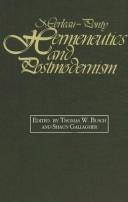
ISBN: 0791411400 0791411397 9780791411391 9780791411407 Year: 1992 Publisher: Albany State university of New York press
Abstract | Keywords | Export | Availability | Bookmark
 Loading...
Loading...Choose an application
- Reference Manager
- EndNote
- RefWorks (Direct export to RefWorks)
Hermeneutics --- Postmodernism. --- History --- -Postmodernism --- Post-modernism --- Postmodernism (Philosophy) --- Arts, Modern --- Avant-garde (Aesthetics) --- Modernism (Art) --- Philosophy, Modern --- Post-postmodernism --- Interpretation, Methodology of --- Criticism --- -Merleau-Ponty, Maurice --- Postmodernism --- Merleau-Ponty, Maurice, --- Merleau-Ponty, Maurice --- Hermeneutics - History - 20th century. --- Merleau-Ponty, Jean Jacques Maurice, --- Merlō-Ponty, Mōris, --- Ponty, Jean Jacques Maurice Merleau-, --- Ponty, Maurice Merleau-, --- מרלו־פונטי, מוריס,
Book
ISBN: 0792308247 9780792308249 9401067740 9400906390 Year: 1990 Volume: 5 Publisher: Dordrecht Kluwer
Abstract | Keywords | Export | Availability | Bookmark
 Loading...
Loading...Choose an application
- Reference Manager
- EndNote
- RefWorks (Direct export to RefWorks)
Hermeneutics --- History --- Ricœur, Paul. --- -Interpretation, Methodology of --- Criticism --- -Ricoeur, Paul --- -Lü-ko-erh --- Ricœur, P. --- Li-kʻo, Pao-lo --- ريكور، بول --- ريكور، پول --- Рикёр, Поль --- Rikër, Polʹ --- Contributions in hermeneutics --- -Ricœur, Paul --- Lü-ko-erh --- Ricœur, Jean Paul Gustave --- Contributions in hermeneutics. --- -History --- Ricœur, Paul --- Hermeneutics - History - 20th century. --- Ricoeur, Paul (1913-2005) --- Cogito --- Herméneutique --- 20e siècle

 Search
Search Feedback
Feedback About UniCat
About UniCat  Help
Help News
News